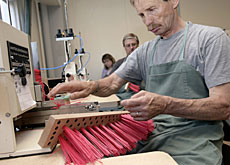Disability insurance scheme still needs help

The Swiss disability insurance scheme is still not out of the woods according to Swiss newspapers commenting on Sunday's vote that will cut benefits for the disabled.
Editorialists argue that the vote is a step in the right direction but now parliament has to take measures to try to solve the scheme’s ailing finances.
Nearly 60 per cent of voters came out in favour of annual spending cuts of about SFr500 million ($402 million) and a reduction by 20 per cent in the number of new beneficiaries each year.
The Neue Zürcher Zeitung newspaper comments that the annual deficit of about SFr1.5 billion should be reduced in the mid-term but the debt mountain of SFr10 will not disappear on its own.
A temporary increase in value-added tax would bring the disability scheme’s finances back into order, it argues.
The Bund newspaper of Bern said that the result found a clear majority because the disability insurance scheme was only relevant for a small part of the population.
“It was easy for the majority to realise that because of the billions of debt… the situation could not continue as before. It’s clear that if this were the old age pension scheme, which affects everybody, any modification would not have it so easy at the ballot box.”
Responsibility
The Geneva newspaper Le Temps made the point that employers now had to live up to their responsibilities and show that reintegration of disabled people into the labour market was not just a “pious wish”.
The Zurich Tages-Anzeiger commented along the same lines, saying this was not going to be easy.
The also said that the success of the law would be measured by a reduction in the number of new benefits to people with disabilities, particularly the young suffering from psychological problems.
For the Quotidien jurassien, the four French-speaking cantons that voted against the cuts “doubt that the economy will make the necessary efforts [to reintegrate the disabled] without being forced”.
La Liberté of Fribourg even sees in the result of the vote a new Röstigraben or
Rösti trench – a term frequently used in political discussion to describe the differences of mentality between the German- and French-language regions.
It said the French-speaking part of the country was obviously more sensitive to social issues than the German-speaking part.
Winners or losers?
A number of newspapers beg the question whether those directly concerned by Sunday’s vote – disabled people – were the winners or losers.
The Zurich tabloid Blick said this was this could only be assessed after a number of years, once the measures in the revision of the disability insurance scheme had been put into practice.
The Aargauer Zeitung notes along with several other newspapers that Interior Minister Pascal Couchepin could once again be happy with the result of a nationwide vote.
His smiling face on the front covers of the Blick and Der Bund, says it all.
swissinfo, Robert Brookes
Final results of Sunday’s vote:
Yes: 59.1%
No: 40.9%
Turnout: 36.3%
The number of beneficiaries increased to 256,300 last year from 173,216 in 1997. 3.2% of the total population claimed disability benefits in 1990, the figure rose to 5.3% in 2005.
The percentage of claimants unfit for work for psychological reasons increased to 37.5% from 28% in the same period.
The disability insurance scheme, which was set up in 1960 and is administered by the state old age pension scheme, made a deficit of SFr1.6 billion and accumulated debts of SFr9 billion last year.
For the first time in the history of the insurance system the number of new beneficiaries dropped in 2006 also as a result of stricter checks introduced in 2004.

In compliance with the JTI standards
More: SWI swissinfo.ch certified by the Journalism Trust Initiative










You can find an overview of ongoing debates with our journalists here . Please join us!
If you want to start a conversation about a topic raised in this article or want to report factual errors, email us at english@swissinfo.ch.